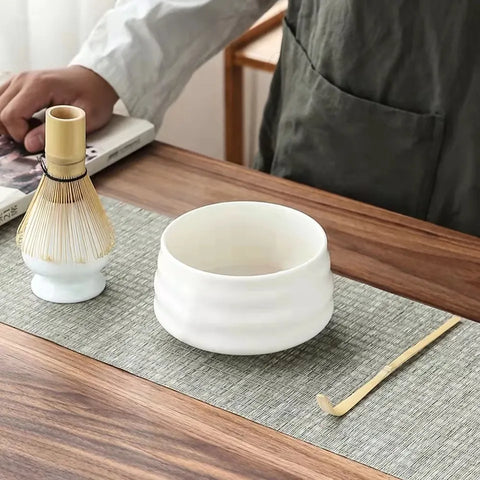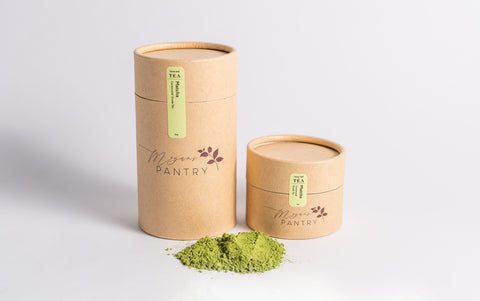
The Marvel of Matcha
Share


Benefits of Matcha
Rich in Antioxidants: Matcha is packed with catechins, a type of antioxidant that helps to protect the body from free radicals and oxidative stress. Epigallocatechin gallate (EGCG), a specific catechin in matcha, is believed to have potent health-promoting properties.
Boosts Energy and Focus: Matcha contains caffeine, but it also contains an amino acid called L-theanine. The combination of caffeine and L-theanine provides a calm and focused energy boost, without the jitters or crashes associated with other sources of caffeine.
Supports Metabolism: Some studies suggest that the compounds in matcha, particularly EGCG, may help to increase metabolism and promote fat oxidation, potentially aiding in weight management.
Promotes Relaxation: The L-theanine in matcha is known for its calming effects. It can induce a sense of relaxation without causing drowsiness, making matcha a popular choice for promoting mindfulness and reducing stress.
Brain Health: The combination of caffeine and L-theanine in matcha has been linked to improved cognitive function, including enhanced attention, memory, and mental clarity.
Detoxification: Chlorophyll, the pigment responsible for matcha's vibrant green color, is believed to help detoxify the body by eliminating harmful toxins and heavy metals.
Heart Health: Some research suggests that the antioxidants in matcha may help lower LDL cholesterol levels, reduce the risk of heart disease, and improve overall cardiovascular health.
Supports Immune System: Matcha contains various vitamins, minerals, and antioxidants that can contribute to a stronger immune system, helping the body defend against infections and illnesses.
Anti-Inflammatory Properties: The antioxidants in matcha, particularly EGCG, have been shown to have anti-inflammatory effects that may help reduce inflammation-related conditions.
Aids Digestion: Matcha can have a soothing effect on the digestive system and may help improve gut health due to its fiber content.
Dental Health: Some studies suggest that the catechins in matcha may inhibit the growth of bacteria in the mouth, leading to improved oral health and reduced risk of cavities.
Cancer Prevention: While more research is needed, some studies have indicated that the antioxidants in matcha, especially EGCG, may have potential anti-cancer properties.
It's important to note that while matcha offers potential health benefits, consuming it in moderation as part of a balanced diet is recommended. Additionally, individual responses to matcha may vary, and it's always a good idea to consult with a healthcare professional before making significant dietary changes.
A Note on Quality
Quality must be considered when selecting your matcha. Why is quality so paramount? First and foremost, it's about flavor. High-quality matcha boasts a vibrant, umami-rich taste that dances on the palate, a far cry from the bitter or lackluster experiences that lower-grade matcha can offer. It's the difference between savoring a fine wine and a generic grape juice.
Moreover, quality matcha undergoes meticulous shading, harvesting, and processing, preserving its vibrant green color and nutrient profile. Lesser grades can lack this attention to detail, resulting in duller hues and diminished nutritional value.
Preparation
A traditional matcha set includes a bowl, bamboo whisk, a bamboo scoop, and a stand to maintain the shape of the bamboo whisk once it has gotten wet. Like this one that we sell here at Megan's Pantry:

Here are a few ways that I love to prepare my matcha, as well as some I'm anxious to try! There are so many delicious ways to enjoy this delicate and nutritious treat.
- Traditional Matcha Tea (Usucha):
- Ingredients: Matcha powder, hot water.
-
Instructions:
- Sift 1-2 teaspoons of matcha powder into a bowl.
- Add hot (but not boiling) water (about 175°F or 80°C) to the bowl.
- Use a bamboo whisk (chasen) to whisk the matcha vigorously in a zigzag motion until it's frothy and well mixed.
- Enjoy as is or with a traditional sweet like a wagashi.
-
Thick Matcha Tea (Koicha):
- Ingredients: Higher-grade matcha powder, less hot water.
-
Instructions:
- Sift 2-3 teaspoons of high-quality matcha powder into a small bowl.
- Add a small amount of hot water (about 2 tablespoons).
- Whisk slowly and deliberately until a thick, smooth paste forms.
- Serve in a small cup or bowl, typically during traditional Japanese tea ceremonies.
-
Matcha Latte:
- Ingredients: Matcha powder, milk (or milk alternative), sweetener (optional).
-
Instructions:
- Sift 1-2 teaspoons of matcha powder into a cup.
- Heat your milk (or milk alternative) and add it to the matcha.
- Sweeten to taste, if desired.
- Use a whisk or frother to mix until smooth and frothy.
-
Iced Matcha Latte:
- Ingredients: Matcha powder, cold milk (or milk alternative), ice cubes, sweetener (optional).
-
Instructions:
- In a glass, sift 1-2 teaspoons of matcha powder.
- Add a splash of hot water and whisk until smooth.
- Add cold milk and ice cubes.
- Sweeten to taste and stir until well combined.
-
Matcha Smoothie:
- Ingredients: Matcha powder, banana, spinach, almond milk (or any preferred liquid), honey (optional), ice.
-
Instructions:
- Blend all the ingredients together until smooth.
- Adjust the sweetness and thickness to your liking by adding more honey or liquid.
-
Matcha Baking: Matcha can be incorporated into various baked goods like matcha cookies, matcha cakes, and matcha muffins for a unique flavor and a burst of antioxidants.
-
Matcha in Cooking: Matcha can be used as a seasoning or garnish in savory dishes like matcha-flavored rice or as a coating for proteins like fish or chicken.
-
Matcha Cocktails: For a twist on classic cocktails, you can add matcha to drinks like martinis, mojitos, or even margaritas for a unique flavor and a vibrant green color.
Remember, the quality of matcha you use can significantly affect the taste and experience, so it's worth investing in high-quality matcha powder for the best results. Enjoy your matcha in the way that suits your taste preferences and creativity!

